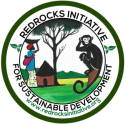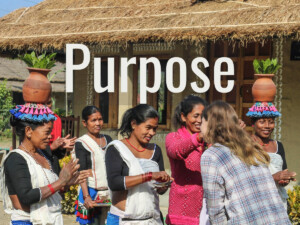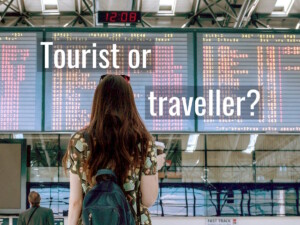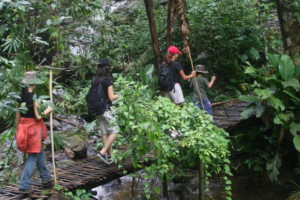“GT” Insight Bites: Diverse perspectives on travel & tourism and a fairer world

How can travel & tourism contribute to a fairer world?
For this “GT” Insight Bites, your correspondent put the question above to a range of travel & tourism stakeholders, and invited written responses of up to 300 words.
My thanks to all 15 respondents.
Their answers appear in the order in which I received them … because it’s fair. 🙂
- Greg Bakunzi — At its best, tourism offers opportunities for all
- Saverio Francesco Bertolucci — Travel, tourism, hospitality can be fair
- Susan Eardly — Tourism is all about dealing with human beings
- Stasja Koot — Centralise different values over economic growth
- Michael Haywood — We need to enact fairness principles
- Jim Butcher — Even ‘mass tourism’ can contribute to a fairer world
- Karen Simmonds — Kindness and respect matter
- Malcolm Roughead — Scotland hopes for a ‘happier and fairer place’
- John Roberts — Travel & tourism can contribute ‘on every level’. But …
- Melanie Kay Smith — Life isn’t fair and neither is travel & tourism
- Richard A Shepard — Tourism can contribute to a more ‘equitable’ world
- Shamiso Nyajeka — ‘Ubuntu’ may help southern African tourism become fairer
- Edwin Magio — People and planet over profit
- Nico Eden — Fairness important in every meeting, plan, and policy
- Bert van Walbeek — It’s ‘like dreaming the impossible dream’
- What do you think?
Previous “GT” Insight Bites:
- Diverse perspectives on economic degrowth and tourism
- Diverse perspectives on visitor dispersion
At its best, tourism offers opportunities for all
Greg Bakunzi, Founder, Red Rocks Initiative for Sustainable Development & Red Rocks Rwanda
The hospitality, travel, leisure, and recreation sectors are together very large, interconnected, and reliant on each other. Their most important economic feature is that they contribute to three high-priority goals, such as generation of income, employment, and foreign exchange earnings.
The tourism industry leads to the creation of attractions, restaurants, entertainment, and better services in a community. It has a positive impact on other industries too, such as agriculture, transport, and manufacturing, not forgetting the potential positive effects on the local community.
This industry yields significant economic and social benefits around the world, and possesses the power to change people’s lives for the better by driving economic growth and development, reducing poverty through the provision of livelihoods, and fostering tolerance and peace through intercultural exchange and understanding.
Tourism clearly contributes to the economic and social development of a nation, by driving economic growth, creating jobs and wealth, and fostering trade and encouraging investment. And as it is built on a foundation of person-to-person engagement and cooperation, that fosters higher-level diplomatic relations, and can contribute to a more tolerant geopolitical climate and regional integration.
For individuals who travel, the horizon-expanding experience of an exotic destination exposes them to cultures, customs, and experiences that increase their tolerance and understanding. That can be beneficial for hosts too.
At its best, tourism offers every individual the opportunity to take up jobs, acquire business and language skills, and realise entrepreneurial and other professional opportunities, resulting in human capital development, and upward social mobility.
Travel, tourism, hospitality can be fair
Saverio Francesco Bertolucci, Administrative Assistant, Alcambarcelona, Spain
Even though the travel & tourism/hospitality sectors are included in the same industry, their contribution to a fairer world is different and must be divided.
My previous research — in Island Studies Journal and Journal of Responsible Tourism Management — clearly shows that tourism can be an asset for community development, economic prosperity, and social well-being if backed by responsible rules that focus on inclusiveness, transparency, and efficiency.
Due to neverending tourism development, many destinations suffer from mass tourism, which is causing local antagonism and backlash. In this situation, allowing most stakeholders’ voices to be heard will yield a better understanding of the situation.
Stakeholders sitting together and talking about their issues can be the basis for setting fair and practical common ground rules and effective legislative compromises.
Concerning travel, moving from one place to another is a daily action in the life of every human. In the current experiential tourism economy, individuals love to travel to get out of their comfort zones and visit new destinations inhabited by people with different cultures and traditions.
Travel and fairness can be synonymous if travel is understood to be a means towards reciprocal respect between host and guest. Mutual respect and successful cohabitation — however temporary — between parties can only happen if destinations target, attract, and welcome the right customers.
Tourism is all about dealing with human beings
Susan Eardly, Founder, Serene Vacations, Sri Lanka
Passionate travellers will continue travelling.
Are service providers ready to offer great service based on a fairer, more human approach to all their stakeholders?
While destinations and tourism stakeholders strive to regain lost economic positions in the aftermath of the COVID-induced recession, it’s important for them to focus on a sustainability that is based on the basic values of travel & tourism: Respecting people, nature, and different cultures.
Tourism is all about dealing with human beings.
I believe that travel & tourism is more about the interests and creativity of travellers than it is about the investments and revenues of service providers. Thus travellers can contribute to fairness by respecting every culture they encounter, and helping to ensure that environments are protected.
A collaborative approach towards a fairer world is vital.
To summarise, I would say that:
- Travel & tourism should respect people and protect culture and nature.
- Travel & tourism will continue to face strong challenges such as climate change, new technologies, economic downturns, and political and social issues, which will require a collaborative approach to overcome.
- Destinations needs inclusive, sustainable, and resilient governance models.
- A more humanised approach to travel & tourism is essential.
Centralise different values over economic growth
Stasja Koot, Assistant Professor, Wageningen University, the Netherlands; Senior Research Fellow, University of Johannesburg, South Africa
The question is based on the premise that tourism can make such a contribution, and although that sometimes happens, this premise needs scrutiny first.
Without denying some jobs created for a small number of ‘local’ people, it is important to acknowledge that this does not automatically make travel & tourism ‘fairer’.
Jobs create salaries that people work for, filling in labour demands that the industry needs.
Moreover, most people working in global tourism are low-wage labourers, often under bad circumstances.
Nonetheless, such jobs are often presented as ‘benefits’ by the industry. But, just like many philanthropic initiatives that the industry supports, these jobs do not convincingly address structural inequalities.
Moreover, based on my own work in Namibia, South Africa, and Indonesia I find it important to stress that (eco)tourism needs much land, which is then unavailable for other types of livelihoods, while the jobs created only employ a few.
Historically, many such tracts of land that are now used for tourism were used for other livelihoods, and contemporary jobs in tourism are embedded in neo-colonialism.
And there are ecological issues:
Tourism, including aviation, is highly consumptive, thereby contributing to climate change, global biodiversity loss, and pollution.
Tourism increases economic growth, but capitalises on the limited availability of natural resources. So to visit an ‘ecolodge’ in South Africa when coming from Europe, for instance, is not ‘fair’, as those already living in the margins of society are hardest hit by these ecological problems.
Travel & tourism is part of — and pushes forward — a much larger global system and ideology that centralises continuous economic growth.
If we really want to make this industry fairer, other values need priority, in particular long-term socio-economic justice and environmental sustainability at a global scale.
We need to enact fairness principles
K Michael Haywood, Professor Emeritus, University of Guelph, Canada
The Berlin Declaration revealed that a fairer world might emerge if, collectively, we set our sights on “transforming tourism”.
In support of the 2030 Agenda for Sustainable Development many options to achieve this have emerged, including community-based tourism and degrowth, both of which have generated interest and critique.
Everyone is conflicted as to how best to balance tourism’s wide range of benefits, costs, and consequences in different contexts, communities, and countries.
But, with what’s considered fair and reasonable for one representing an anathema to the other, what are we to do?
We’re well aware that the core ethical value of fairness comes with moral obligations, usually associated with the exercise of power, that bestow benefits or impose burdens.
In our various capacities and roles, almost everyone has the power to give or withhold benefits — jobs, money, praise, support — and to impose burdens — exclusion, disapproval, criticism, destruction.
Because we render judgements that affect lives, we should be compelled to take responsibility, not just place the burden for change and transformation on others.
How might this play out?
In addition to my previous commentary and suggestions, consider the importance of ensuring communities-as-destinations articulate a meaningful purpose for tourism.
We would do well if we encourage ourselves and decision-makers to hone soft skills, pursue cultural fluency, and develop what psychologists call ‘theory of mind’; the capacity to infer how others are thinking and feeling, not only through narrative thought but through the development of contextual intelligence.
In more forthright terms, we need to enact fairness principles that utilise the ‘veil of ignorance’ to test fairness; fairness that is concerned with all our behaviours, decisions, and actions — processes and consequences — to ensure that they are morally right, honourable, and equitable.
Even ‘mass tourism’ can contribute to a fairer world
Jim Butcher, Reader, Canterbury Christ Church University, UK
I don’t think anyone associated tourism with contributing to a fairer world up until the 1980s, when ethical consumption became a part of the political scene.
Prior to that, holidays were holidays, period.
In 1987 Krippendorf wrote The Holiday Makers. This well-known book marked out the start of the growth of ‘ethical tourism’.
Then, from the 1990s, new ethical tourism niches purported to offer the chance to do good whilst having fun.
Who could object to that?
Ecotourism turned from a vacation for nature lovers into a marker of a virtuous lifestyle. Volunteer tourism tried to persuade us that holidays and saving the poor were of a piece.
Bringing fairness through ethical tourism niches is often the performative politics of the wealthy, with the poor as extras.
For me, a truly fairer world would be one in which the benefits of modern society — including tourism of all types — were more widely available.
The ethical tourism niches that trade on ‘fairness’ are often associated with a romantic conception of the community, the village, and local customs; to be preserved in the face of a threat from modernity.
I am absolutely sympathetic to people who feel tourism impinges upon important aspects of their life and culture, and is in that sense ‘unfair’. We’ve seen instances of that recently, from the Maasai Mara to Machu Pichu and Mallorca.
But the bigger, neglected issue is that the choices of those communities, and the individuals within, them are constrained by a lack of wealth.
The biggest unfairnesses in our society stem from a denial of wealth, not from a surfeit of modern development. In that sense mass tourism and its growth could be said to contribute to a fairer world.
Kindness and respect matter
Karen Simmonds, Founder, Travel Matters & Make Travel Matter, UK
Travel & tourism enables us to meet new people and experience their culture and land.
When we travel, we are reminded that we are visitors cared for by hosts in the communities we visit.
If we all gave more thought and consideration when we travel, people and the planet would be in a better place.
Demonstrating kindness and treating people with respect surely has a positive impact on fairness.
We exist together.
The Guiding Principles of the Future of Tourism Coalition provide a clear moral and business imperative for building a fairer tourism industry while protecting the places and people on which it depends.
At Travel Matters we believe that one’s travel experience should be reflected in self-growth as a human being, particularly in relation to oneself and others.
Through our Make Travel Matter campaign we educate travellers on how their behaviour can contribute to a better way of travelling, enabling more conscious decisions.
We want travellers to be more proactive in relation to protecting the environment and the communities they encounter along the way.
Our wish is to make people’s travels really matter, and we want their travel experiences to be complete with learning from the involvement of host communities.
Scotland hopes for a ‘happier and fairer place for everyone’
Malcolm Roughead, Chief Executive, VisitScotland, UK
The world has changed since the outbreak of COVID-19. Seismic shifts have been inescapable for the tourism industry.
In Scotland, as in many countries, the damaging impact of the pandemic has been keenly felt. But it gave us time to reflect.
Recent research by VisitScotland has found a great deal of agreement amongst the resident population on the importance of tackling issues such as climate change, and some willingness when it comes to changing future travel behaviours.
For years success has been measured in visitor numbers. Criticism has come quickly if the numbers go down, but now is the time to look at how we can encourage people to slow down, stay longer, and ensure that tourism in Scotland can be enjoyed by all.
In 2021, VisitScotland launched the ScotSpirit Holiday Voucher Scheme to help low-income families and unpaid carers, who might not be able to take a short holiday, take time out to enjoy the best of Scotland.
It’s important that we work to support those businesses that hold up the industry, from airlines to cafes, hotels to farm parks. A careful balance must be established between the economics of restarting businesses and creating jobs and ensuring that communities don’t feel that their vital resources are being threatened.
The reality of responsible tourism is in encouraging visitors to spread throughout the country and year. This will mean an enhanced experience for visitors, a better time for communities, better seasonal and regional outcomes, and an all-round happier and fairer place for everyone.
We know that tourism is a force for good. It creates jobs, sustains communities, contributes significantly to the economy, and improves our well-being. As the industry recovers, we hope it can do so in a more inclusive and mindful manner.
Travel & tourism can contribute to fairness ‘on every level’. But …
John Roberts, Group Director of Sustainability & Conservation, Minor Hotels (Anantara & AVANI)
How can travel & tourism contribute to a fairer world? Done right? On every level!
The most obvious is wealth redistribution.
Wealth can flow from those who have enough to afford the luxury of moving themselves temporarily to another place to see something new, or to relax in a pristine environment, to those who perhaps don’t and whose ability to afford the fundamentals of life can be improved.
A proportion of every dollar spent in and on a tourism destination will filter through to the local community; the trick is to find destinations, businesses, and government tax regimes that ensure that proportion is as large as possible.
Less directly, the act of travel, of seeing new things and meeting new people, helps foster understanding between cultures, a willingness to know and see the ‘other’, and to understand different perspectives on life.
Once you understand people you are more likely to want to help them in whatever small way when you can. Stronger connections — and motivations to help — are formed with people you have met, places you have been.
Of course, if done badly, travel & tourism can lead to greater unfairness.
Communities can be driven unfairly from their land, people can be smuggled and forced to work for a non-living wage, food prices might increase, or rare resources may be given to travellers for the profit of the few rather than those who need it.
The potential for unfairness is why it is important not to travel in blinkers.
Look around you. Don’t support things that feel unfair.
Importantly, look for Global Sustainable Tourism Council certification for accommodation, travel operators, and destinations.
And book direct with communities if you can.
Life isn’t fair and neither is travel & tourism
Melanie Kay Smith, Associate Professor / Programme Leader, Budapest Metropolitan University, Hungary
As children, how many times did we hear the words “life isn’t fair”?
The same is unfortunately true of tourism. It is still largely a privilege of the well-off and, with rising fuel and living costs, it is likely to stay that way.
Post-COVID, educated middle classes everywhere are torturing themselves with the decision of when, if, and how to travel. They are hesitating before booking flights and (quite rightly) considering issues of environmental sustainability.
Are we being fair to the planet when we place undue burden on its resources? Despite rising awareness of conservation needs and wildlife protection in some destinations, no-one could argue that the positive environmental impacts of tourism outweigh the negatives!
However, it is important to remember that the fairness of travel & tourism also relates to supporting the economies of destination and communities, especially those that were previously dependent on tourism.
If, for example, Europeans stop taking long haul flights, what will this mean for developing countries in Asia or Africa?
Are we being fair to those destinations when we favour our own relatively well-developed national economies with our staycations, excursions, and domestic travels?
Fairness also means ensuring that travel is possible for the greatest number of people in society. But is tourism a luxury or a necessity? Is it a basic human right?
The answer to this is not altogether clear in an era of post-overtourism where it is only too obvious that over-consumption of any kind is unsustainable.
Ideally, government funds should be made available for social tourism to allow less well-off members of society to travel too. But this brings us back to whether tourism is a necessity or a right and determining who should pay.
It seems that we are all paying the price for the privilege of the few.
Tourism can contribute to a more ‘equitable’ world
Richard A Shepard, Trustee & CEO, Sustainable Rural Development International, UK
I’d like to change the question. It should not be a ‘fairer’ world, but a more ‘equitable’ one. It’s too long to delve into the distinction, but there is one. Most conflate the two.
In essence ‘fairness’ means treating everyone the same while ‘equity’ requires a more nuanced approach that takes into consideration multiple factors.
If students, for example, were treated fairly, then all students would be afforded the same structured education. But no, we treat them equitably. Students with special needs are provided different opportunities.
Having reframed the question, the short answer is ‘yes, but’.
Tourism can contribute to a more equitable world, so long as local economic needs, environment, and social structures are taken into consideration.
It means that tourism needs to be taken to a more granular level, from the ground up, to look at local needs and capacity.
That is the whole point, I think, of sustainable tourism because concrete actions can be taken to make tourism more equitable locally, rarely nationally.
Destinations can determine what is best for themselves. In the majority of cases they can only do that with the guidance, assistance, and local buy-in of all stakeholders in the tourism value chain.
Changes made locally can impact national policies if implemented gradually and consistently. Grand statements of policy from national governments — or for that matter in giant conferences — usually deliver no concrete results.
Local endeavours can also ensure that the majority of traveller expenditure stays in the destination where it will benefit the people who provide the services.
In our experience, when local people are allowed to organise, plan, and improve their livelihoods, the local environment and culture is also better protected.
Tourism can contribute to equity by recognising local needs and acting accordingly, while influencing national policies and goals.
‘Ubuntu’ may help tourism in southern Africa become fairer
Shamiso Nyajeka, Masters student, Dalarna University, Sweden
With millions of travellers moving across the globe, creating billions in export revenues each year, the travel & tourism industry is well positioned to play multiple roles in transferring wealth from richer societies to poorer ones, steering the world towards a more equal society.
As simple as this may sound, it is marred by several complexities. For instance, while Europe accounts for nearly 40% of international tourism receipts, Africa, a region with a substantial proportion of the world’s poor, only generates 3%.
This shows the gravity of inequality on a global scale.
However, for tourism to make a meaningful contribution to a fairer world, the focus should not only be on the disparities among regions but also within countries.
From a southern African perspective, governance has been a major barrier to realising tourism’s potential to reduce inequalities within countries.
Corruption and political power struggles often skew the benefits of tourism towards the few elites at the expense of the community.
In the absence of good governance, tourism’s contribution to reducing inequalities remains a distant dream.
Despite some adoption of pro-poor, community-based, and sustainable tourism practices there is still a glaring inequality gap in our region.
It is perhaps an ideal time to consider embracing Ubuntu, an ideology that has sustained southern African societies for generations.
Without taking anything away from existing approaches, Ubuntu is naturally more relatable to the inhabitants of southern Africa.
Ubuntu values are centred on ‘humanness’: Serving the community; a responsibility to and for each other; and prioritising human development, compassion, and empathy.
Embracing these homegrown values in tourism governance may not be the panacea to development in our region, but could help us create a conducive framework for the sector’s contribution to a fairer society.
People and planet over profit
Edwin Magio, Teaching & Research Assistant, Moi University, Kenya; Commonwealth Scholar, Leeds Beckett University, UK
Travel & tourism has an impact on the world and therefore must be designed and managed in a way that benefits everyone.
Here I provide three insights into how travel & tourism can contribute to a better world for all:
Shifting the industry towards greater equity
Despite efforts to advance sustainable tourism, fairness for disadvantaged local groups, including the poor, ethnic minorities, and indigenous peoples, has been slow to emerge.
For example, only a small fraction of tourism spending goes to the Maasai community here in Kenya.
Travel & tourism stakeholders must integrate equity into their interventions by meaningfully including communities, especially indigenous and disadvantaged groups, in decision making and ensuring that benefits are shared equitably.
Addressing human rights issues
The tourism industry has a reputation for poor working conditions characterised by low wages and seasonality. Therefore, considerable efforts should be made to ensure the rights of workers.
Stakeholders must ensure that those working in the travel & tourism sector are adequately compensated, treated appropriately, and given promotion opportunities.
In addition, reforms are needed to prevent discrimination, and to promote the health and well-being of people who are particularly vulnerable, such as children, women, indigenous peoples, ethnic minorities, and people with disabilities.
Considering people and planet over profit
We have witnessed how economic returns and pressures to meet visitor needs can override the genuine aspirations of locals and concerns for the natural environment.
If we want to create long-term sustainability for the world — and a fairer world — we must prioritise the interests of communities and the environment over profits.
There are other ways to get tourism on track to contribute to a fairer world. However, in my opinion, these three are best placed to make the greatest strides.
Fairness important in every meeting, plan, and policy
Nico Eden, Founder, Eden Consulting
A way in which the travel & tourism industry can contribute to a fairer world is by revenue-sharing through local committees focussed on community development.

This structure drives socio-economic and environmental initiatives, as both conservation and community walk hand-in-hand.
It is also essential to work with and listen to local communities on how to develop sustainable practices, and share methods and techniques together.
And, where possible, it is important to work with local suppliers that share similar values and who are able to demonstrate how and what they are doing contributes to a ‘fairer world’.
Empowering employees with resources and encouraging them to take action within their respective communities can create longevity for sustainable action.
In short, focus on ‘People, Purpose, and Profit’.
Sharing initiatives with travellers through purpose-driven guest experiences invites them to be part of the positive impact narrative and rewards them with inspiration.
None of us would have predicted the turbulence the industry experienced over the last few years. Crisis management has been at the forefront of operations.
However, during that time there has been an evolution in the travel & tourism industry and the mindset of our guests. We have seen a great uptick in consumer interest and spending on purpose-driven tourism, and a growing demand for experiences that have community and conservation values at all levels.
A fairer world should be an important consideration in every business plan, every board meeting, and every policy mandate across all sectors and industries.
And investing in a green future for all of us is not only a good business decision but is also good for the planet, as Jeremy Rifkin tells us in his book A Green New Deal.
It’s ‘like dreaming the impossible dream’
Bert van Walbeek, consultant, author, and lecturer, UK
Before answering that question, another question: “What is fair?”
According to the Oxford Language Dictionary it means: “Treating people equally without favoritism or discrimination.”
Fair describes something as being free of bias or injustice. Fair also describes something as being done according to the rules, or as neither good nor bad.
Regrettably, these days we live in a world full of bias, injustice, and evil conflicts worldwide that disrespect all rules.
Above all, inequality disproportionately affects the vast majority of people living on our planet.
The world’s population in 2019 (the last “normal” tourism year) was 7.7 billion and the WTTC reported 1.5 billion international visitor arrivals. This means that at least 6.2 billion inhabitants of this world did not have the opportunity to travel internationally.
Senior government and business executives tell each other at conferences that travel & tourism is one of the most important economic sectors worldwide.
But there is a huge price to pay. Tourism reinforces social inequality, leads to environmental problems, and strains local cultures due to the demonstration effect.
Looking for answers to the question reminds me of a chanson called “Parole, Parole”.
“Encore des mots, toujours des mots, les mêmes mots”
(“Still words, always words, the same words”)
The only way travel & tourism eventually might contribute to a fairer world is by educating the next generation(s) and training the present stakeholders, including consumers, on topics such as:
- Respect for foreign cultures;
- Ecological compatibility;
- Involvement of the local population; and
- Human rights.
Therefore, as long as “contributing to a fairer world“ is used as a sleeping aid for our self-serving conscience in this world full of bias and injustice, the question raised is, sadly but realistically, like dreaming the impossible dream.
It is not about how, but a matter of when.
What do you think?
What do you think? Share your own thoughts in a comment below. Or write a deeper “GT” Insight. The “Good Tourism” Blog welcomes diversity of opinion and perspective about travel & tourism, because travel & tourism is everyone’s business.
Featured image (top of post): Fair fun for some. There are diverse perspectives on how travel & tourism can contribute to a fairer world. Photo of Coney Island through a chain link fence by sebastien cordat (CC0) via Unsplash.





















